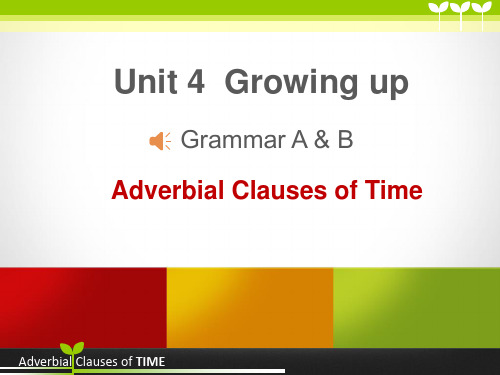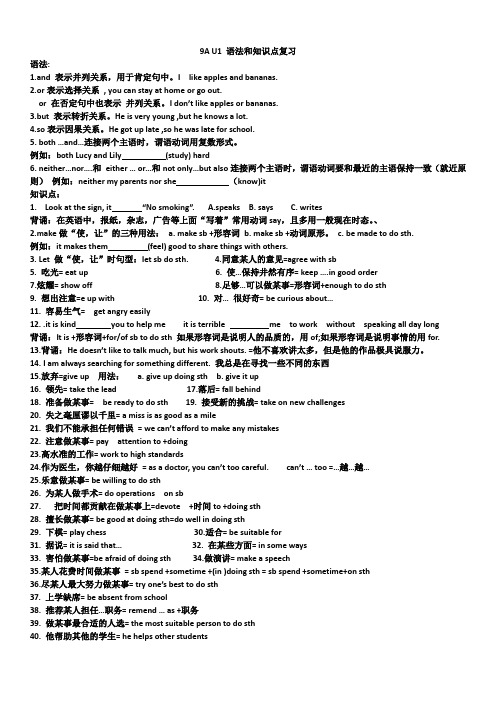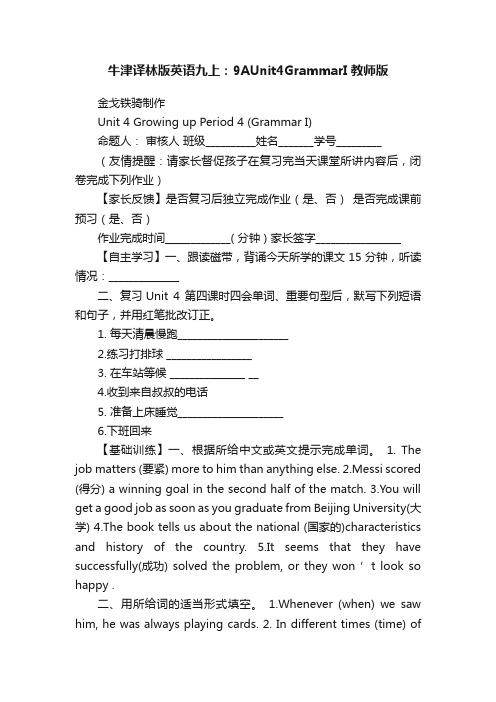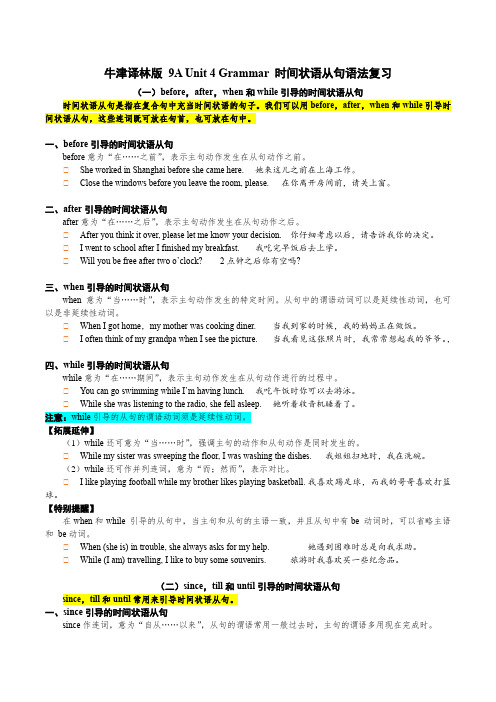牛津译林版英语九上:9AUnit4GrammarI教师版
牛津译林版英语九上9AUnit4grammar公开课课件

注意:whenever可以用 everytime替换。
C1.Practise:Fillintheblankswithassoonasorwhe never.
assoonas 1.Davidwillgotoplaybasketball___________schoolisove r. 主将从现 whenever 2.HewatchestheNBA_________thereisagameonTV. 3._________hetalksaboutbasketball,hegetsexcited. Whenever 4.___________helearntthattheNBAplayerswouldcomet Assoonas oChina,hetriedhisbesttogetaticket.
3.ImetPeter.Iwaswaitingatthebusstop. ___________________________________ ImetPeterwhile(Iwas)waitingatthebussto _______________________________ p. 4.IwaswatchingTV.Ireceivedacallfrommyu ncle. While(Iwas)watchingTV,Ireceivedacallfro ___________________________________ mmyuncle. ________________________________ 5.Iwasreadytogotobed.Myfathercamebackf romwork. Iwasreadytogotobedwhenmyfathercameba ___________________________________ ckfromwork. ________________________________
牛津英语9A_Unit4_Growing_up_Grammar_[PPT课件白板课件思维导图知识点]苏教版初三九年级上册
![牛津英语9A_Unit4_Growing_up_Grammar_[PPT课件白板课件思维导图知识点]苏教版初三九年级上册](https://img.taocdn.com/s3/m/2eb76fac8762caaedd33d46f.png)
I go jogging every morning before I have breakfast.
2. I practised playing basketball for hours. I felt tired out.
I went to school after I finished my breakfast. 我吃完早饭去上学。
1. You can’t watch TV____ you finish your homework. (2013 泰州)
A. after B. if
C. when
D. before
2.You should hand in your test paper __ you check it . (2014 常州)
A. while B. when
urn off the lights _b__e_f_o_r_e__ you leave the room. = You should turn off the lights __b_e_f_o_r_e_ _le__a_v_in_g__ the room.
Tip3 : when means at a certain time.(在某个特定的时间点)
While/When he was attending junior high,
he joined the Shanghai Youth Team.
When/While mean during Tip4 : a certain time.( 在特定的时
时间状语从句是指在复合句中充当时间状 语的句子。如:
牛津译林英语 9A Unit-4-Grammar(25张PPT)

Kid David: a trouble maker
D: run in the street M: ask him to come back
D: play baseball break the vase
ቤተ መጻሕፍቲ ባይዱ
D: jump on the bed M: stop him
Unit 4 Growing up
Grammar A & B Adverbial Clauses of Time
Adverbial Clauses of TIME
the Slam Dunk Contest in 1986
Adverbial Clauses of TIME
SOMETHING ABOUT SPUD
Adverbial Clauses of TIME: WHEN/ WHILE
Kid David: a trouble maker
David: run in the street
Mom: ask him to come back
David was running in the street when his mother asked him to come back. While (When) David was running in the street, his mother asked him to come back.
Adverbial Clauses of TIME: WHEN/ WHILE
Kid David: a trouble maker
David: play baseball
break the vase
牛津译林版九年级上册 9A Unit 1-8 语法和知识点

语法:1.and 表示并列关系,用于肯定句中。
I like apples and bananas.2.or表示选择关系, you can stay at home or go out.or 在否定句中也表示并列关系。
I don’t like apples or bananas.3.but 表示转折关系。
He is very young ,but he knows a lot.4.so表示因果关系。
He got up late ,so he was late for school.5. both …and…连接两个主语时,谓语动词用复数形式。
例如:both Lucy and Lily (study) hard6. neither…nor….和either … or…和not only…but also连接两个主语时,谓语动词要和最近的主语保持一致(就近原则)例如:neither my parents nor she (know)it知识点:1.Look at the sign, it “No smoking”. A.speaks B. says C. writes背诵:在英语中,报纸,杂志,广告等上面“写着”常用动词say,且多用一般现在时态。
、2.make做“使,让”的三种用法:a. make sb +形容词b. make sb +动词原形。
c. be made to do sth.例如:it makes them (feel) good to share things with others.3. Let 做“使,让”时句型:let sb do sth.4.同意某人的意见=agree with sb5. 吃光= eat up6. 使…保持井然有序= keep ….in good order7.炫耀= show off 8.足够…可以做某事=形容词+enough to do sth9. 想出注意=e up with 10. 对… 很好奇= be curious about…11. 容易生气= get angry easily12. .it is kind you to help me it is terrible me to work without speaking all day long背诵:It is +形容词+for/of sb to do sth 如果形容词是说明人的品质的,用of;如果形容词是说明事情的用for.13.背诵:H e doesn’t like to talk much, but his work shouts. =他不喜欢讲太多,但是他的作品极具说服力。
牛津译林版-英语-九上--教案:4单元 Grammar

课题9A Unit 4 Grammar教学目标Learn the use of “before, after, when, while, since, till, until, as soon as, and whenever”.重点难点教学过程Step 1 RevisionTranslation:1. 上初中阶段,Spud 参加了学校篮球队的选拔。
2. 他接下来成了足球队的领队。
3. Lily更加刻苦地练习并使教练改变了主意。
4. 没有大学愿意邀请他去打篮球,仅仅因为他的身高。
5. 在他毕业以后,他被迫在另一个篮球联盟效力。
Step 2 Grammar1. Learn the use of before, after, when and while, then complete the Part A.A Using before, after, when and whileB Using since, till and untilC Using as soon as and whenever1) I go jogging every morning. Then I have breakfast.2) I practised playing basketb all for hours. I felt tired out.3)I have been crazy about playing basketball ________ I was a little boy.4) The weather has been awful this week. The rain did not stop _______ yesterday eve ning, so we could not practise basketball for se veral days.5)We played basketball in the playground this afternoon _________ it was getting dark.6)David often goes to play basketball _______________ school is over.7)He watches the NBA ____________ there is a game on TV.8) ________________ he learnt that the NBA players would come to China, hetried his best to get a ticket.一、before, after, when, while, till, until, as soon as, whenever引导的时间状语从句中,如果主从句都是将来发生的动作,主句用一般将来时,从句用一般现在时。
牛津译林版英语九上9A Unit4 Growing up

9A Unit4 Growing upPeriod4(Grammar)一、词组翻译1.be come serious about_______2.try one's best________________3. do charity work____________4.be crazy about, .. ____________5. at the beginning____________6.a ticket for the film___________7.get excited________________ 8. gold medal_________________二、根据首字母提示写出单词1. World War I broke out at the b_______ of the twentieth century.2. In order to improve your English, you had better keep a d_______ in English every evening.3. The room is in an a_______ mess.4. The angry teacher got the student to stand a_______ the blackboard.5. Chinese good a_______ won 148 gold medals in the 11th Asian Games.6. The car is quite small, e_______ if you have children.7.I was surprised to l_______ _______ that he had failed the examination.8. Something must be done to e_______ their quarrel.三、句型转换1.He knew little English, _______?(改为反意疑问句)2.He tried his best to get a ticket.(对画线部分提问)_______ _______ he try his best to_______?3.Will he return from the UK? Could you tell me…?(改为宾语从句)________________________________________________________?4.The information is very useful.(改为感叹句)_______ _______ _______ it is!5.Lucy gave Peter some advice.(改为被动句)Some advice_______ _______ _______ _______ by Lucy.Peter_______ _______ some advice by Lucy.6. After she had finished all the housework, she began to do her lessons. (用not...until改写)She_______ _______ to do her lessons_______ she had finished all the housework.四、用给出单词正确的时态填空1. By the time I got to the station, the train_______ (leave).2. Betty said she_______ ( visit) the Great Wall next Saturday.3. My sister will come to visit me whenever she_______ ( come) back.4. It is the first time I_______ ( speak) French in a public place.5. We_______ ( watch) TV from seven to nine last night.6. The teacher told s students that the earth_______ ( travel) around the sun.7. I_______ (forget) to bring my English book, and I have left it at home,8. We_______ ( get) to the station before the train left.9. I_______ (live) in the city all my life.10. Sorry, I_______ (not see) the sign "No spitting".五、单项填空( )l.Peter will cook for his parents_________the International Day of Families comes.A.unless B.when C.until D.although( )2.My father likes reading a newspaper________he is haying breakfast-u A·until B.because C.while D.though( )3.My mom took me to the park_________she washed the clothes.A.now B.however C.whenever D.after( )4.I’m_________building a new zoo as I think zoos are terrible places for animals to live.A.against B.on C.in D.for( )5.一Can you tell me your decision right now?一Let me think about it carefully_________I give you the answer.A·before B.after C.since D.as soon as( )6.一Would you please give this book to Mary?一Sure.I’ll give it to her________she comes back.A.before B.till C.until D.as soon as( ) 7.一Wait for me at the bus stop_______I come back,will you? 一No problem.A.if B.till C.while D.although( )8.It’s more than ten years since I__________a teacher.A·become B.became C.has become D.was becoming( )9.一Oh,so many people are standing outside the hall._______will the film stan7 一__________seven o’clock.A.How soon;Not until B.How long;Not untilC.How soon;Until D.How long;Until( ) 10.I met Lucy in the primary school and we________c1ose friends ever since.A·have been B.have become C.were D.became( )11.________I go to see him,he is busy working on his 1essons.A.However B.Whoever C.Whatever D.Whenever( )12.They will try their best in the Dragon Boat Race ________they may fail.A.if B.although C.until D.so六、完形填空Never try to work when you are very hungry.If you want to do your homework right after school, you may eat something before getting to work. Never try to work when you are very1 . Always do your homework before you get too tired. Don’t wait2 late in the evening, or the homework will seem3 than it really is.Divide your time into a few parts if you have more than 4 work. Have a short rest every forty minutes. However, don’t divide up your time 5 short to do anything. You should he able to work at least half an hour at a time without 6 .Don’t 7 doing your homework until the last minutes,If you put off doing your homework,you will have it on your mind and you won’t 8 your free time so much. If you put off until the end of the week or even before a test, you will have too much catching up9 . A little bit each night, enough to keep up with what is happening each day in school, will take the fear at tests and keep you on top of it all.Do your homework at the same time every day. This will help you make it a 10 —part of you daily work. It will make it easier to do,and it will make your free time more enjoyable as well.( )1. A. full B. hungry C. angry D. busy( )2. A. until B. before C. after D. when( )3. A. hard B. more hard C. much hard D. much harder ( )4. A. an hour B. one hour C. an hour’s D. an-hours ( )5. A. so B. too C. such D. very( )6. A. stop B. stops C. stopped D. stopping( )7. A. put off B. put on C. put away D. put up( )8. A. spend B. take C. enjoy D. like( )9. A. do B. to do C. doing D. did( )10. A. habit B. hobby C. pleasure D. joy七、阅读理解One of the most famous surgeons(外科医生)of traditional Chinese medicine was Sun Simiao (581—682AD) ,the most famous physician of the Tang Dynasty. When he was a child, he was often sick. But he was a very cute boy and he was fond of reading, especially a lot of books about medicine.Sun Simiao practiced and studied medicine by living in mountains for his whole life. And he wrote a few famous books. Among these, the two most famous are Qian Jin Yao Fang and Qian Jin Yi Fang. The two books are both about medicine and the treatments of many illnesses. There are 6,500 prescriptions in the two books ,which cover many things in life. Therefore ,they are of great value.Besides this, Sun Simiao also had great ideas about what a doctor could do and could not do. In his opinion, doctors should be knowledgeable and hard-working first. What’s more, they should treat their patients as their relatives; they should be very patient and be kind to their patients.Sun Simiao once wrote a book about doctors. It is known as Da Yi Jing Cheng. It is one of the greatest and most important books in Chinese history.Because of his kindness to patients and his two great medical books ,Sun Simiao was called “the King of Medicine”.( )1. Sun Simiao was from ____.A. JapanB. CanadaC. ChinaD. America ( )2. Sun Simiao was ____when he was young.A. in good healthB. in poor healthC. lazy and carelessD. good at playing basketball( )3. Qian Jin Yao Fang and Qian Jin Yi Fang are about____.A. famous people in historyB. how to play soccer and basketballC. painting and dancingD. medicine and the treatments of many illnesses( )4. According to Sun Simiao’s opinion, a doctor should ____.A. read a lot of booksB. know many peopleC. be very patient and love his patientsD. write books about medicine( )5. ____ is a book about doctors written by Sun Simiao.A. Qian Jin Yao FangB. Qian Jin Yi FangC. Da Yi Jing ChengD. The King of Medicine八、句子翻译1.我预祝大家岁首大吉。
牛津译林版9A Unit4 Grammar(I)课件ppt

2.How to use after
After means later than a certain time a.after引导的时间状语从句如果具有将来意义,往往 要用一般现在时来表示(有时也用现在完成时),而不能 直接用一般将来时。如: 误:I’ll tell him after you wil leave. 正:I’ll tell him after you leave (或have left). 你走了之 后我再告诉他。 b.选择一般现时或现在完成时(表示将来意义)的基本原 则是:如果强调从句 动作在主句动作之前完成,则用 现在完成时;如果强调主从句动作 同时发 生,或几 乎同时发生(尤其是当从句的谓语动词是get, arrive, see, hear, leave, return等表示迅速完成的动作的动词时),多 用一般现在时(有时 两种时态都可以)。如; I’ll leave after he comes back. 他回来后我就离开。
c. 一般说来,如果在过去某一时间内先后发生了两个动 作,那么先发生的动作用过去完成时,后发生的动作用 一般过去时。但是若用连词after 来连接这两个动作, 由于after本身已说明了两个动作的先后关系,所以两 者均可用一般过去时。如: After he (had) closed the door, he left the house. 关 了门之后,他就离开了家。 d. 有时以连词after引导的时间状语从句可以换成一个以 介词after引导介词短语或以连词after引导的分词短语, 而意义不变。如: He went to school after he had breakfast (=after breakfast). 吃了早饭之后,他就去上学了。 After l had finished (=After having finished / After finishing / Having我干完活后就去睡觉了。
牛津译林版英语九上:9AUnit4GrammarI教师版

牛津译林版英语九上:9AUnit4GrammarI教师版金戈铁骑制作Unit 4 Growing up Period 4 (Grammar I)命题人:审核人班级__________姓名_______学号_________(友情提醒:请家长督促孩子在复习完当天课堂所讲内容后,闭卷完成下列作业)【家长反馈】是否复习后独立完成作业(是、否)是否完成课前预习(是、否)作业完成时间_____________( 分钟 ) 家长签字_________________【自主学习】一、跟读磁带,背诵今天所学的课文15分钟,听读情况:______________二、复习Unit 4 第四课时四会单词、重要句型后,默写下列短语和句子,并用红笔批改订正。
1. 每天清晨慢跑______________________2.练习打排球 _________________3. 在车站等候 _______________ __4.收到来自叔叔的电话5. 准备上床睡觉_____________________6.下班回来【基础训练】一、根据所给中文或英文提示完成单词。
1. The job matters (要紧) more to him than anything else. 2.Messi scored (得分) a winning goal in the second half of the match. 3.You will get a good job as soon as you graduate from Beijing University(大学) 4.The book tells us about the national (国家的)characteristics and history of the country. 5.It seems that they have successfully(成功) solved the problem, or they won ’t look so happy .二、用所给词的适当形式填空。
Unit4Grammar时间状语从句语法复习牛津译林版英语九年级上册

牛津译林版9A Unit 4 Grammar 时间状语从句语法复习(一)before,after,when和while引导的时间状语从句时间状语从句是指在复合句中充当时间状语的句子。
我们可以用before,after,when和while引导时间状语从句,这些连词既可放在句首,也可放在句中。
一、before引导的时间状语从句before意为“在……之前”,表示主句动作发生在从句动作之前。
▶She worked in Shanghai before she came here.她来这儿之前在上海工作。
▶Close the windows before you leave the room, please.在你离开房间前,请关上窗。
二、after引导的时间状语从句after意为“在……之后”,表示主句动作发生在从句动作之后。
▶After you think it over, please let me know your decision.你仔细考虑以后,请告诉我你的决定。
▶I went to school after I finished my breakfast.我吃完早饭后去上学。
▶Will you be free after two o’clock?2点钟之后你有空吗?三、when引导的时间状语从句when意为“当……时”,表示主句动作发生的特定时间。
从句中的谓语动词可以是延续性动词,也可以是非延续性动词。
▶When I got home,my mother was cooking diner.当我到家的时候,我的妈妈正在做饭。
▶I often think of my grandpa when I see the picture.当我看见这张照片时,我常常想起我的爷爷。
,四、while引导的时间状语从句while意为“在……期间”,表示主句动作发生在从句动作进行的过程中。
▶You can go swimming while I’m having lunch.我吃午饭时你可以去游泳。
牛津英语译林版九年级上册 9A Unit4 Speak up 、Study skills

Speak up知识点: 1. 一个12岁的男孩 a 12-year-old boy
an 8/11/18-year-old boy an 80-year-old man an 8-hundred-word article a one-to-one interview 2. 逃离 get away from e.g. 小偷拿走了我们所有的钱逃离了商店。
15. 躲藏在一个秘密的地方
go into hiding in a secret place
16. 七千万人在战争中失去了生命
70 million people lost their lives during the war.
17. 成为人类精神胜利的一个象征
become a symbol of the victory of the human spirit
We hope war never happens again.
But to some countries, only war can stop war!
Millie and Simon are talking about World War II. Work in groups and discuss what you know about it.
18. 写下她的想法,感情,希望和对未来的梦想
write down her thoughts, feelings, hopes and
dreams for the future
单项选择
( C )1. Passengers (乘客) are requires to _____
seated(坐着) until the plane comes to a full stop.
Unit4语法讲义时间状语从句牛津译林版九年级英语上册

9A Unit 4语法讲义(时间状语从句)一、状语从句的概念在主从复合句中作状语的句子被称为状语从句。
三、时间状语从句1、before 引导的时间状语从句before “在...之前” 连词+时间状从(主一过从一过)e.g. He remained there for about a year before the NBA took notice of him.介词+时间点/doing e.g. before 9 a.m.2、after 引导的时间状语从句after “在...之后” 连词+时间状从(主一过从一过)e.g. The sun came out after the storm stopped.介词+时间点/doing e.g. after lunch3、when 引导的时间状语从句when “当...的时候” 连词+时间状从(主短从长、主长从短、主短从短、主将从现)长:现在/过去进行时,即谓v.是be +doing 短:一般现在/过去时,即谓v.是原形、三单、过去式e.g. The earthquake started when I was doing some cleaning the other day.e.g. Daniel was watching TV when the earthquake started.e.g. When he finally got the chance, he scored 20 points in his first game.e.g. she returns.“什么时候” 4、while 引导的时间状语从句while “当...的时候” 连词+时间状从(主短从长、主长从长)e.g. While the boys were playing football, it rained.e.g. Daniel was watching TV while his mother was washing the dishes.“而” 表对比e.g.You like sports while I like reading.注意:在[含有(when/while引导的)时间状语从句的]主从复合句中,若主句和从句的主语一致,且从句的谓v.是be动词,则可省略从句的主语和bee.g. when (he was) attending junior high, Spud tried out for the school team.( )1.A true friend can see the pain in your eyes ______ everyone else believes the smile on your face.A.whileB.becauseC.beforeD.until( )2.It is summer now in China, ______ it is winter in Australia.A.beforeB.untilC.whileD.since5、since引导的时间状语从句since“自...以来”(1)现在完成时/一般现在时+since+一般过去时主句从句( )1.[易错题]It ________ four years since my family ________ to Xiamen.A.is; have moved B.has been; has moved C.is; moved D.was; moved( )2.[变式题]How time flies! Four years ________ since I ________ to our Middle School.A.have passed; came B.has past; came C.has passed; came D.have passed; have e3. It has been a couple of years since I came to our Middle School.(改为同义句)A couple of years ________ ________ since e I came to our Middle School.(2)since+过去时间点 e.g. since then(自那时以来), since 2008, since two years ago( ). ________ no one is against this plan, let’s carry out it.A. SinceB. UntilC. AlthoughD. So6、till/until和not...till/until引导的时间状语从句till/until “直到...为止”(顺译)连词+时间状从(主一过从一过)e.g. He remained there for about a year till/until the NBA took notice of him.延续性动词=before介词+时间点 e.g. till/until today★not...till/until...“直到...才”(倒译)连词+时间状从(主一过从一过、主将从现、主情从现、主祈从现)直到(从句)才(主句)e.g. I did n’t go to bed till/until I finished my homework.短暂性动词e.g. Smokers wo n’t realize the importance of health till/until they lose it.短暂性动词e.g. For your safety, you must n’t get close to the train till/until it stops.e.g. Do n’t wake me up till/until you finish building it.( )1. [变式题]Nothing can be done _______ he returns.A.asB.untilC.whileD.before( )2. [变式题]—May I borrow another two books, Madam?—Sorry. No more books can be borrowed until these two ______.A.returnB.are returnedC.will returnD.will be returned( )3.—I’m afraid the meeting has begun. —Don’t worry. It _______ until the bell _______.A.will begin; ringsB.doesn’t begin; will ringC.won’t begin; will ringD.won’t begin; ringsNot until+一般现在时( )1. —Sir, when can we have two days off ? —Not until your task _______ tomorrow.A.pletesB.is pletedC.will be pletedD.will plete( )2. —Excuse me, when shall we play tennis at the court? —Not until it _______ next week.A.repairsB.is repairedC.will be repairedD.repair[区分] How long提问till/until,when提问Not until...( )1.—When will the rain stop? —________ next Friday. The radio says it will last for a week.A.UntilB.BeforeC.AfterD.Not until( )2.—________ will the negotiation(谈判) between the two countries last(持续)?—________ they reach an agreement(协议), I am not sure.A.How long; Not until B.When; Not until C.How long; Until D.When; Until( )3.—Mr. Li, when will the plan that solves the problem be ________?—________ all the engineers e to have a further discussion.A.turned out; Until B.taken out; Until C.broken out; Not until D.carried out; Not until [拓展]not...until...的倒装句结构和强调句结构倒装句结构:Not until+从句+主句(部分倒装语序)部分倒装:把助动词、情态动词提前强调句结构:It is/was not until+从句+that+主句(陈述语序)基本结构:We didn’t get off the bus until it stopped.倒装句结构:Not until it stopped did we get off the bus.强调句结构:It was not until it stopped that we got off the bus.( )1.[提优]Not until he left the small village __________ the world is really big.A.he did realizeB.did he realizeC.he realizedD.realized he( )2.[提优]It was not until he left the small village that __________ the world is really big.A.he did realizeB.did he realizeC.he realizedD.realized he7、as soon as引导的时间状语从句as soon as possible= as soon as sb. can/could( ). —______________ I called you, you went downstairs _______________.A.As soon as; as soon as you canB. As soon as; as soon as possibleC. Whenever; as soon asD. Since; as quickly as possibleas soon as+一般现在时( ). —When shall I hand in my report? —As soon as it _______ tomorrow.A pletes B.is pleted C.will be pleted D.will plete8、whenever引导的时间状语从句whenever “每当;无论何时” 连词+时间状从(主一现从一现、主一过从一过、主将从现、主情从现)My parents were always there for me I needed them.。
Unit4知识点讲解及练习牛津译林版英语九年级上学期

9A Unit4 Growing up知识点梳理词性转换lead领导(v./n.)→leader领导者(n.)simple简单的(adj.)→simply简单地,仅仅(adv.)nation国家,民族(n.)→national国家的(adj.)success成功(n.)→successful成功的(adj.) successfully成功地(adv.) succeed成功(vi.)achieve实现,达成(vt.)→achievement成就(n.)survive幸存(vt.)→survivor幸存者(n.)usual寻常的(adj.)→unusual不同寻常的(adj.)die死亡(vi.)→dead死亡的(adj.) dying临死的(adj.) death死亡(n.)短语、句型归纳1.What’s on your mind? 你有什么心事?on one’s mind 挂在心上,惦念in one’s mind 在某人看来make up one’s mind 下定决心change one’s mind 改变主意2. Growing up is hard! 长大真难啊!3. What’s up?=What’s the matter?=What’s wrong? 怎么了?4. build another one for yourself 为你自己建造另一个(房屋)build sth. for sb. 为某人建造某物5.Don’t wake me up until you finish building it. 直到你造完(房屋)再叫醒我。
finish doing sth. 完成做某事6. allow me to learn about people in different times and places使我能了解不同时期和地方的人allow doing sth. 允许做某事7. read them whenever I want to 无论何时我想读就读他们8. learn about the world through the Internet 通过因特网了解世界9. As soon as you click t he mouse, there’s a great deal of information.你一点击鼠标,就会有大量信息。
译林版牛津英语9A 全册知识点解析

4)“确实是这样”,表示对前面陈述事实的强调,结构为so+主语+助动词/情态动词/be动词
例:Tony works very hard at all the subjects.So he does.
(1)用于否定句。提出两或多种事物。意为“也不”。
例: I can’t sing or dance.我不会唱歌也不会跳舞。
(2)用于警告或忠告,意为“否则,不然”
例: Hurry up, we will be late.快点,否则我们要迟到了。
(3)用于两个数字之间表示约略数目,意为“大约”。
例:There are six or seven children in the room.房间里大约六七个孩子。
After working all afternoon,we quickly ate up all of the dinner.我们整整干一个下午以后,一会儿就把饭吃光了。
(2)use all of用完;消耗
Extravagance ate up his inheritance.奢侈的生活耗尽了他继承的遗产。
“I think so.”
3)“也是,也一样”结构为so+助动词/情态动词/be动词+主语
例:Tony takes exercise every day and so does his younger brother.
注意否定句应把so改为neither/nor,结构为neither/nor+助动词/情态动词/be动词+主语
6. We can’t afford to make any mistakes.我们承担不起任何错误(所造成的后果)
牛津英语译林版九年级上册 9A Unit4 Task

A.While B.After C.Before D.Until
( C )9.We visited Huaxi Village last Sunday and had
some photos _____there.
A.took B.taking C.taken D.to take
8. go into hiding
10. 她的姐姐死于疾病 9. be sent to a Nazi camp
11. 让她的日记出版
10. her elder sister died of illness
12. 一直在日记上写
11. have her diary published
13. 被纳粹人发现
already.
3.The TV set doesn't work. I will have it __r_ep__a_ir_e_d_(repair) this afternoon.
4.Li Lin is very kind and helpful. Wherever he __is__n_e_ed__ed__(need), he can offer some help. 5._U__n_h_a_p_p_i_n_e_ss_(happy) was sprung(起源于) from rapacity(贪婪) 4.It's a famous book and really worth_r_e_a_d_i_n(gread)
_____the barriers between them. A.break off B.break down C.break up D.break out
( B )4.--Are all the students from_____in your class?
牛津译林版英语9AUnit4Grammar课件

牛津译林版英语9A Unit4 Grammar课件一、教学内容本节课我们将学习牛津译林版英语9A Unit4 Grammar部分。
具体内容包括:章节1中的现在完成时态,以及章节2中的现在完成时态与一般过去时的区别。
我们将详细讲解现在完成时的构成、用法和注意事项,并通过实例分析,让学生更好地掌握这一时态。
二、教学目标1. 学生能够理解现在完成时态的构成和用法,并能在实际情境中灵活运用。
2. 学生能够正确区分现在完成时态和一般过去时态,避免混淆。
3. 学生能够运用所学知识进行日常交流,提高英语口语表达能力。
三、教学难点与重点教学难点:现在完成时态与一般过去时的区别。
教学重点:现在完成时的构成和用法。
四、教具与学具准备1. 教具:PPT、黑板、粉笔。
2. 学具:练习本、笔。
五、教学过程1. 导入:通过一个实践情景,引出现在完成时态。
例如,展示一个学生从图书馆借书的场景,让学生描述这个事件。
2. 讲解:详细讲解现在完成时的构成(have/has + 过去分词)和用法,并通过例句展示。
3. 例题讲解:分析两个句子,让学生判断哪个句子使用了现在完成时态,哪个句子使用了一般过去时态。
4. 随堂练习:让学生进行小组讨论,互相练习描述过去发生的事情,并运用现在完成时态。
6. 互动环节:邀请学生上台展示自己的练习成果,其他同学进行评价。
六、板书设计1. Unit4 Grammar2. 内容:a. 现在完成时态的构成:have/has + 过去分词b. 现在完成时态的用法:描述过去发生的事情对现在的影响c. 现在完成时态与一般过去时的区别七、作业设计1. 作业题目:2. 答案:a. I have watched a movie last night.b. I have watched a movie last week.八、课后反思及拓展延伸1. 反思:本节课学生对现在完成时态的掌握程度,以及课堂互动情况。
2. 拓展延伸:让学生收集生活中使用现在完成时态的例子,下节课分享。
2011版初中英语新课标同步授课课件:unit 4 grammar(译林牛津版九上)(精品课件在线)

after 用作连词或介词,在…之后,引导时间状 语(名词,代词,动名词,从句等)表示这句动 作发生在主句动作之___前____。
After he painted the windows, he painted the doors.
house at Halloween.
5. Don’t read _in_ the sun. It’s bad for your eyes. 6. We have no lessons _b_e_tw__e_e_n 3:50 p.m. and 4:50
p.m. every day. 7. There is a lot of news _in_ today’s newspaper. 8. Can you swim _in_ the river?
教师教学说课
适用于教育教学、教师说课、学生作业、汇报总结
讲解人:教育者
Unit 4 TV programmes
Grammar
Sports World
Beijing Music Awards
Murder in a Country House
Tiger Watch
Sunshine TV 10 a.m.-11.30a.m.
• He didn’t go to bed until his father came back from work.
• until=till 但是till不可以放在句首
B before, after, until
• e.g.:
• _B_e_f_o_r_e_the awards start, we will interview some of the most famous stars.
牛津译林版九年级上英语9上Unit 4 Grammar教案设计

课题9上Unit 4 GrammarIntegrated skills主备人第 5 课时教学目标1. To listen carefully and try to get the details they need to finish some tasks.2. To learn about the danger of the wars.3. To talk about one’s life experience according to time clues4. To talk about the topic about wars..教学重点To listen carefully and try to get the details they need to finish some tasks. To learn about the danger of the wars.教学难点To talk about one’s life experience according to time clues To talk about the topic about wars.教法与教具Heuristic teaching method, task-based teaching method.Group discussion methodA small blackboard and a tape recorder教学过程个人复备自主先学1. Revise the important knowledge of last class. Do some practice on the blackboard.2. Preview the new lesson.小组讨论1. Present some pictures about World War II and teach the new words like symbol and victory etc. Then show a video about World War II and introduce Anne and her diary.2. Discuss what caused to people.交流展示Listening1Part A1 1) Go through the table first with the students together , make sure they know what they’re going to listen to .2) Play the CD for them to listen and get the information they need ,and finish A13)Ask some questions about Part1,after checking the answers.Q1:Who wrote the book The Diary of a Young Girl?2:When was the book first published?3:How many languages has the book been translated into?4:Why is the book so important?4).Let the students read partA1 loudly.课时数年月日质疑拓展Listening2Now we will learn more about the writer, Ann Frank. Next, we will listen to PartA2, pay attention to the time mentioned in the recording.. Check the answers together.Step4:PracticePart A3 Listen to the recording again and finish partA3 and then read the passage together.检测反馈Speak up1) Listen with questions : .How old was the boy in the bookI Am David?What does Simon admire?2) Listen and answer some questions.3) Read after the CD loudly and make sure their pronunciations are correct.4)Read and act the dialogue.5) Do more exercises.小结反思1. Show some exercises on the small blackboard and get students to finish them by themselves.2. In this period, students should learn to find the useful information from the listening materials and can finish the exercises correctly.板书设计教后札记。
- 1、下载文档前请自行甄别文档内容的完整性,平台不提供额外的编辑、内容补充、找答案等附加服务。
- 2、"仅部分预览"的文档,不可在线预览部分如存在完整性等问题,可反馈申请退款(可完整预览的文档不适用该条件!)。
- 3、如文档侵犯您的权益,请联系客服反馈,我们会尽快为您处理(人工客服工作时间:9:00-18:30)。
初中英语学习材料madeofjingetiejiUnit 4 Growing up Period 4 (Grammar I)命题人: 审核人 班级__________姓名_______学号_________ (友情提醒:请家长督促孩子在复习完当天课堂所讲内容后,闭卷完成下列作业)【家长反馈】是否复习后独立完成作业(是、否) 是否完成课前预习(是、否) 作业完成时间_____________( 分钟 ) 家长签字_________________【自主学习】一、跟读磁带,背诵今天所学的课文15分钟,听读情况:______________二、复习Unit 4 第四课时四会单词、重要句型后,默写下列短语和句子,并用红笔批改订正。
1. 每天清晨慢跑______________________2.练习打排球 _________________3. 在车站等候 _______________ __4.收到来自叔叔的电话5. 准备上床睡觉_____________________6.下班回来【基础训练】一、根据所给中文或英文提示完成单词。
1. The job matters (要紧) more to him than anything else. 2.Messi scored (得分) a winning goal in the second half of the match. 3.You will get a good job as soon as you graduate from Beijing University(大学) 4.The book tells us about the national (国家的)characteristics and history of the country. 5.It seems that they have successfully(成功) solved the problem, or they won ’t look so happy.二、用所给词的适当形式填空。
1.Whenever (when) we saw him, he was always playing cards. 2. In different times (time) of my life, I had different dreams. 3. I think watching table tennis match is simply (simple) a waste of time. I have no interest in it. 4.Flying across the Atlantic Ocean for the first time was a great achievement (achieve) in the human history. 5.---Did you hear anything unusual (usual) in the next room? ---No. I was chatting with my friends online.三、用所给动词的适当形式填空 1.Newton was playing (play) under an apple tree while an apple fell onto his head. 2.What do you want to do after graduating (graduate) from college? 3.We have succeeded (succeed) in saving thousands of people in danger since we got to Ya ’an.4.He didn ’t eat (not eat) supper until he finished his homework.5.We were swimming in the lake when suddenly the storm started (start).四、翻译句子。
1.当那些德国人到达机场时,雨真下得很大。
It was raining heavily when the Germans arrived at the airport.2.正当我看电视时,我收到了来自叔叔的电话。
When I was watching TV , I received a call from my uncle.3.在NBA 注意到他之前,他已苦练篮球很多年。
Before the NBA took notice of him, he has practiced playing basketball for years.4.知道你学了化学你才会知道它对我们多有价值。
You will know how valuable Chemistry is until you learn it.5.吃早饭之前,我总是在操场上慢跑。
Before having breakfast, I always go jogging_on the playground.五、单项选择。
( A )1.China doesn’t have a strong football team. Maybe it will be hundreds of years _______the Chinese 初三英语作业纸九年级上册team wins the World Cup. A. before B. since C. after D. when( B )2.He was told that it would be at least three more months _______ he could recover and return to work.A.whenB. beforeC. sinceD. that( A ) 3.Amy was reading a book ______ I came in. A. when B. while C. because D. though(A )4.---Why didn’t you tell him about the meeting? ---He rushed out of the room____ I could say a word.A.b eforeB. untilC. whenD. after( B )5.---I’m going to the post office.---____ you are there, can you get me some stamps?A. WhenB. WhileC. BecauseD. If【能力提高】阅读理解It’s normal for parents to disagree and argue from time to time. Parents might disagree about money, housework or how to spend their time. They might even disagree about little things that don’t important at all—like what’s for dinner or what time someone gets home.So, many times when parents disagree, they argue, an argument is a fight using words.Most kids worry when their argue. Loud voices and angry words can make kids feel afraid, sad or upset. Even silent arguments, like parents not talking to each other at all can upset kids.What does it mean when parents argue? First, just like kids, when parents get upset, they must cry, shot or say things they really don’t mean to. Sometimes an argument might not mean anything. Second, just like kids, parents might argue more if they are not feeling well, or if they have other worries.If your parents argue more often, you can talk to someone, like relatives, a teacher or any adult you trust. They can help by telling family members to listen to each other and talk about their feelings without shouting. Though it takes some work, time and practice, people in families can always learn to get along better.No family is perfect. Even in the happiest ones, things happen and people argue from time to time.Being part of a family means everyone joins in and tries to make life better for each other. When an argument happens at home, like to your parents and use love and understanding to solve the problems that have come up. Families can solve almost any problem.( A )1.What’s the meaning of the underlined word “normal” in Chinese in Paragraph I?A. 常见的B. 令人害怕的C. 有趣的D. 没有规矩的( A ) 2. “There are few happy and healthy families” is the key sentence. Which paragraph does it belong to ?A. Paragraph 2.B. Paragraph 3.C. Paragraph 5.D. Paragraph 6.( D ) 3. What’s the main topic of this passage? A. Why do parents argue? B. Children often argueC. When do parents argue?D. Try to make life better二、任务型阅读。
